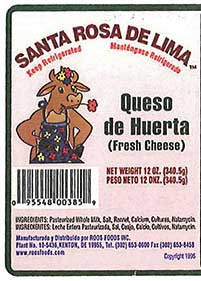 Roos Foods of Kenton, Delaware, lost its FDA approval to sell soft cheese and other products after Queso Fresco was linked to a deadly Listeria outbreak in 2013 that harmed eight people, including three babies. The queso fresco Listeria death occurred in California while all other illnesses were among Hispanics in Maryland. After inspection in early 2014, federal officials cited gaping roof leaks, rusting surfaces and dirty equipment among the reasons for the action. They reported detecting “widespread and persistent” Listeria contamination in the processing facility.
Roos Foods of Kenton, Delaware, lost its FDA approval to sell soft cheese and other products after Queso Fresco was linked to a deadly Listeria outbreak in 2013 that harmed eight people, including three babies. The queso fresco Listeria death occurred in California while all other illnesses were among Hispanics in Maryland. After inspection in early 2014, federal officials cited gaping roof leaks, rusting surfaces and dirty equipment among the reasons for the action. They reported detecting “widespread and persistent” Listeria contamination in the processing facility.
Health officials in Maryland and Virginia started seeing the connection to Roos months after people fell ill from August through November, 2013. On February 19, 2014, the Maryland Department of Health and Mental Hygiene issued a consumer alert not to eat any cheese products made by Roos Foods. Their warning covered Roos Foods cheese products under brand names Santa Rosa de Lima, Amigo, Mexicana, Suyapa, La Chapina, and La Purisima Crema Nica. Five of the illnesses were related to a pregnancy; two of these were diagnosed in two mother–newborn pairs, and one in only the newborn. The three other illnesses occurred among adults.
In response to evidence collected during the investigation by the FDA, the Centers for Disease Control and Prevention and state officials, the state of Delaware’s Division of Public Health issued a Cease and Desist Production and Distribution order to Roos Foods. That was in addition to the FDA’s Suspension of Food Facility Registration. The scientific evidence collected in the Roos Foods Listeria outbreak has provided victims of the outbreak a solid avenue to pursue a queso fresco Listeria lawsuit for compensation of injuries from listeriosis and related losses, including long-term health difficulties that can be projected based on Listeria research.




